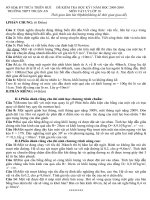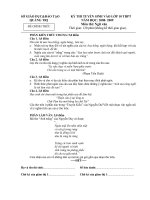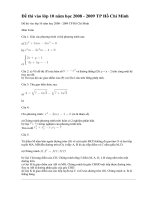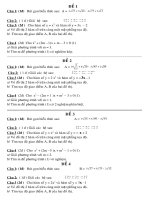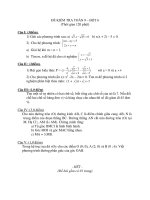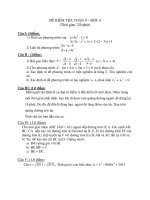đề thi olympic lớp 10 năm học 2013
Bạn đang xem bản rút gọn của tài liệu. Xem và tải ngay bản đầy đủ của tài liệu tại đây (281.79 KB, 20 trang )
SỞ GD&ĐT HÒA BÌNH
TRƯỜNG THPT
CHUYÊN HOÀNG
VĂN THỤ
ĐỀ THI HỌC SINH GIỎI TRẠI HÈ HÙNG VƯƠNG
LẦN THỨ IX
MÔN: TIẾNG ANH LỚP 11
Ngày thi: 02 tháng 08 năm 2013
Thời gian: 180 phút (Không kể thời gian giao đề)
Đề thi gồm:13 trang
(Thí sinh viết câu trả lời vào bảng cho sẵn trong đề)
Điểm Giám khảo 1 Giám khảo 2 Số phách
Bằng số Bằng chữ
PART I. LISTENING
Question 1. Listen to the recording and complete the notes. Write NO MORE THAN
THREE WORDS or NUMBERS for each answer. You will hear this piece twice. (5 points)
Student services Location Cost Availability
Health centre North Campus (1) ___________ for
prescriptions
All students within
the (2) ___________
(3) __________ North Campus 8 sections of
consultations free
All students
Nightline (4) _________ Free By phone: call (5)
____________
Sports centre South Campus £ 22 each year All students
Your answers
1. 2. 3. 4. 5.
1
ĐỀ CHÍNH THỨC
Question 2: You will hear a part of an interview with the astronaut Charles Duke, who is
talking about his trip to the Moon. Choose the best answer A, B, C or D for each question.
You will hear this piece twice. (5 points)
1. How did Charles feel about space travel as a boy?
A. He thought it was unlikely to happen.
B. He regarded it as more than science fiction.
C. He showed no particular interest in it.
D. He was fascinated by the idea of it.
2. What did Charles consider to be the hardest part of the training?
A. Feeling trapped in the heavy spacesuit
B. Being unable to move his arms and hands
C. Constantly being afraid of making a mistake
D. Endlessly practicing the lunar surface landing
3. What was Charles’ reaction when he first found out he was going to the Moon?
A. He felt proud to be given the opportunity.
B. He realized he had to be cautious.
C. He tried to control his excitement.
D. He reflected on his chance of survival.
4. How did the crew feel when they had landed on the Moon?
A. They felt as if they were coming home.
B. They realized they had achieved something special.
C. They were afraid of what they might fight on the surface.
D. They were worried about how they would take off again.
5. What feature of the Moon made the greatest impact on Charles?
A. The loneliness of the place B. The vastness of the sky
C. The brightness of the Sun D. The absence of any star
Your answers
1. 2. 3. 4. 5.
PART II: PHONETICS
Choose the word whose stress pattern is different from the rest of the group (5 points)
2
1. A. development B. inference C. government D. marmalade
2. A. objection B. enjoyment C. official D. optical
3. A. experience B. simplify C. physician D. maternal
4. A. habitable B. infamously C. geneticist D.
communism
5. A. committee B. catholic C. erudite D. altitude
Your answers
1. 2. 3. 4. 5.
PART III. GRAMMAR AND VOCABULARY
Question 1. Choose the most suitable word or phrase (A, B, C, or D) to fill in each blank.
(10 points)
1. If traffic moves at low speed, the number of accidents is________.
A. cut down B. pulled back C. turned off D. put away
2. Students who don’t revise regularly are generally more ________ to making the same
mistakes again and again.
A. prone B. likely C. attentive D. capable
3. I am going to be ________ with you, Mr Hederson. Your daughter is a thief.
A. sincere B. open C. frank D. genuine
4. The crowd ________ in disagreement as the politician left the platform.
A. rustled B. banged C. neighed D. booed
5. The students were ________ until they got the exam results.
A. on edge B. under edge C. in edge D. over edge.
6. As with all our plans, money was the main ________ block.
A. falling B. stumbling C. holding D. tripping
7. I’m ________ my brother is.
A. nowhere like so ambitious B. nothing near as ambitious as
C. nothing as ambitious than D. nowhere near as ambitious as
8. Karen was terribly nervous before the interview but she managed to pull herself ________
and act confidently.
A. through B. over C. together D. off
3
9. She ______ through the report.
A. stared B. glanced C. investigated D. went
10. When he suddenly ________up the subject of genetic engineering, there was a silence
A. took B. brought C. showed D. came
Your answers
1. 2. 3. 4. 5.
6 7 8 9 10
2. There are TEN mistakes in this paragraph. Write them down and give the correction.
(5 points)
1
2
3
4
5
6
7
8
9
1
0
Of the many unexplained phenomenon which continue to puzzle scientists and
laymen like, the corn circles of Southern England remain one of the most
mysterious. These perfect-formed circles, which, when they see from the air appear
to have been inscribed with an enormous carving tool, seem to be a part of a
significant message; so far, however, nobody managed to decipher them, and it is
doubtful if anyone will ever be able to. But the main question – how the circles
came to be there – is just as far of being solved. Although several people had come
forward claiming to have made the circles themselves, scientists declare that it
would be impossible for even a large group to create shapes of such precision on so
a large scale. These circles have become one of the strong arguments in support of
the existence of intelligent extra-terrestrial life forms.
Your answers
line Mistake Correction
1
2
3
4
5
6
7
8
9
10
4
3. Complete each of the following sentences with one suitable preposition or particle. (2.5
points)
1. The meat has gone ________ because of the heat.
2. She’s always _______ the go. I don’t know where she gets her energy from.
3. The machine came ________ when he started it up.
4. I’m not sure how old he is but he must be getting _______ ________ 60.
5. Dr. Smith sees patients only________ appointment.
Your answers
1. 2. 3. 4. 5.
4. Give the correct form of the words in brackets. (10 points)
1. We should arrive two days early in order to ________. (climate)
2. The man has displayed considerable ________ in doing the job.
(expert)
3. In ________ with the rules of the competition, the team was disqualified. (accord)
4. These changes are likely to ________ single-parent families even further. (POOR)
5. I’ve never met such a strong man. His energy seems ________.
(EXHAUST)
6. Most people agree that Christmas has become too ________
(COMMERCE)
7. The doctor tried to ________ the soldier’s wound in a fierce battle. (HEALTH)
8. Mary has no practical experience in treating sick animals.
She only has ________ knowledge of the subject. (book)
9. Will the Eurosport channel provide any ________
(cover)
for the approaching Tour de France?
10. The witness claimed she was capable of discovering the man’s evil
intentions from the _______ look in his eyes. (murder)
Your answers
1. 2. 3. 4. 5.
5
6. 7. 8. 9. 10.
Question 5. Fill each blank with one appropriate word. (5 points).
WHITE CHILDREN NEARLY A MINORITY IN USA
Statistics recently released from the USA's Census Bureau have shown (1) _______
demographics in the U.S. are changing. The figures show that white children in the country
are set to become a minority within the next year or two. It was revealed that currently 49.9%
of American children under the age of five are from non-white (2) _______. Asians and
Hispanics will soon become the new majority ethnic groups in the country. The Bureau gave
two main reasons for this trend. One is that birth (3) _______among minority populations are
growing faster than those in the white community, especially in the Hispanic community. The
second is the steady number of immigrants arriving in America.
The Bureau also reported that for the first time ever, deaths outnumbered births among
whites, in the period between July 2011 and July 2012. During this time, the Hispanic
population grew by 2.2 per cent and the number of Asians rose by 2.9 per cent. Mark Hugo
Lopez from the Pew Hispanic Center says the changes in the make-up of the U.S. population
will have a global (4) _______ . He said: "The U.S. Hispanic population is second (5)
_______ to Mexico's." He noted that the current U.S. Latino population is larger than those in
Peru, Colombia and Spain. He added: "That's something which has an incredible implication
not only in the U.S., but as part of a larger Hispanic world."
Your answers
PART IV. READING
Question 1. Choose the best word or phrase among A, B, C or D that best fits the blank
space in the following passage. (10 points)
Correcting history
Is the history of the world in urgent need of correction? Some historians, mostly
women, argue that insufficient (1) _______has been paid to a very important group: women.
These historians want history textbooks to be revised so that they show accurately the role (2)
_______ by women. According to the history books, cavemen (3) _______ most of the food
1. 2. 3. 4. 5.
6
for their families through hunting animals. But the evidence shows that 80% of the diet of
prehistoric humans was vegetarian and it was collected by females. In addition, women’s
efforts in fighting in wars or leading revolutions have been ignored. Textbooks concentrate on
men such as Hannibal or Che Guevara and neglect (4) _______ women such as Theroigne de
Mericourt, an opera singer who led the storming of the Bastille in 1789, or Mariya
Bochkareva, a Bolshevik who organized a well-trained and (5) _______successful troop of
2,000 fighting women during the Russian Revolution in 1917. Women rulers are also
forgotten. Between 962 and 1582 there were at least 16 women rulers in countries (6)
_______ from Italy to Angola.
Women make up half the human (7)_______ . If there is no (8) _______ to their
contribution to history in the textbooks, then the real story is not being told. However, many
male historians (9) _______that important female figures have been kept (10) _______ the
history books.
1. A. care B. attention C. notice D. study
2. A. done B. got C. played D. had
3. A. provided B. brought C. arranged D. gave
4. A. main B. outstanding C. particular D. primary
5. A. absolutely B. highly C. deeply D. strongly
6. A. differing B. varying C. separating D. ranging
7. A. being B. nation C. people D. race
8. A. reference B. mention C. record D. note
9. A. deny B. refuse C. forbid D. oppose
10. A. in B. off C. out of D. up with
Your answers
1. 2. 3. 4. 5.
6. 7. 8. 9. 10.
Question 2. Read the passage and choose the best answer A, B, C, or D to each question
(10 points)
Architecture has social purposes and meets practical needs by means of combining art
and technological innovations. In building construction, however, an emergence of new
7
materials does not make its precursors obsolete, and architectural knowledge is cumulative.
The fact that today much is constructed from prefabricated concrete does not do away with
brick. Furthermore, despite dramatic changes and increased technological sophistication of
architectural design and construction, the essential apparatus of erecting a building has
remained rooted in preindustrial traditional practices passed down during the millennia. The
social and utilitarian expectations of structures are largely based on elemental demands of
keeping out elements and enemies, avoiding the extremes of heat, wind and precipitation.
Gravity, air pressure, and earthquakes can induce tensions that have to be accounted for
when constructing functional enclosed space. Vertical stacking of masonry materials causes
compression that can lead to important problems when a structure is spanned to build a roof
and connect walls. Arches, vaults, and domes were specifically developed to alleviate the
compression by directing the spanning element along a curve rather than a straight line.
Building suspension structures, dams, and tunnels became possible in the nineteenth century
with the increased availability of steel that could reinforce structural frames and enable them
to withstand natural forces previously believed to be insurmountable.
Functional evolutions of modern buildings create new demands on the analysis of
structural behavior and engineering. Few occupants of skyscrapers view elevators as elaborate
systems of vertical transportation. Humidity and temperature control, forced ventilation,
natural and artificial lighting, sanitation and disposal of waste, electrical wiring and fire
prevention make very tall constructions engineering marvels that also must be aesthetically
pleasing and physically convenient.
Erecting a structure involves a great deal more than merely attending to the aesthetics and
psychological experience of architectural space. The shape, size, and incombustibility of
locally available construction materials fostered developments of specific technologies.
Advances in engineering and knowledge associated with properties of building materials
combine to lead innovations in architectural design. Tools and skills required to exploit easily
obtainable material have continued to inform the development of modem industrialized
technologies.
1. What is the main topic of the passage?
8
A. The modem art of architecture and social pressure
B. The profound importance of tradition in architecture
C. The mutual impact of architecture and technology
D. The great technological advances in building material
2. The word "obsolete" in line 3 is closest in meaning to
A. obvious B. antiquated C. antiquarian D. obstinate
3. The author mentions the word "brick" in line 4 as an example of which of the following?
A. How old techniques can continue to remain practical.
B. How old buildings can co-exist modern architecture.
C. How new knowledge can supplant traditional technology.
D. How new design can improve traditional construction.
4. It can be inferred from the passage that pragmatic requirements of buildings
A. retain essential sophistication B. stay rooted in the elements
C. stagnate over millennia D. hold constant over time
5. What can be inferred from the passage about reducing the effects of material compacting?
A. Masonry is stacked vertically by increasing compression.
B. Downward pressure is dispersed by semicircular roofs.
C. Buildings are spanned to account for the force of gravity.
D. Vertical roofs are bent to counteract air pressure.
6. The word "withstand" in line 16 is closest in meaning to
A. endure B. enlarge C. withdraw D. withhold
7. The purpose of paragraph 3 is to suggest that
A. tall buildings require large amounts of wiring to make them functional.
B. architectural innovations pose new challenges for technological development.
C. skyscrapers need to be appealing and convenient for their occupants.
D. architects of modem buildings create a demand for engineering talent.
8. According to the passage, what is one of the important requirements of building materials?
A. They have to be inflammable. B. They should be locally produced.
C. They do not affect human psychology. D. They need to be large and well shaped.
9
9. The word "fostered" in line 25 is closest in meaning to
A. founded B. focused C. encouraged D. enveloped
10. It can be inferred from the passage that architecture and engineering
A. are at the opposite ends of the technological spectrum
B. go hand in hand to promote art and science
C. compete for technological advancements
D. supersede aesthetic and experiential values
Your answers
1. 2. 3. 4. 5.
6. 7. 8. 9. 10.
Question 3. Read the article and choose the sentence A - G which best summarizes each
paragraph (1-5) of the article. (5points). Example: [0] F
A. An old problem with serious consequences
B. Two new approaches, but can they solve the
problem?
C. Experts say 'Bring back maths!'
D. A potentially tragic error
E. Old methods are no longer satisfactory
F. We couldn't live without them
G. But they are here to stay
[0] ______
Our lives depend on computers. They control our money, transport, our exam results.
Yet their programs are now so complex that no one can get rid of all the mistakes. Life
without computers has become unimaginable. They are designed to look after so many boring
but essential tasks - from microwave cooking to flying across the Atlantic - that we have
become dependent on them.
[1] _______
But as the demands placed on computers grow, so have the number of incidents
involving computer errors. Now computer experts are warning that the traditional ways of
building computer systems are just not good enough to deal with complex tasks like flying
10
planes or maintaining nuclear power stations. It is only a matter of time before a computer-
made catastrophe occurs.
[2] _______
As early as 1889, a word entered the language that was to become all too familiar to
computer scientists: a 'bug', meaning a mistake. For decades bugs and 'de-bugging' were taken
to be part of every computer engineer's job. Everyone accepted that there would always be
some mistakes in any new system. But 'safety critical' systems that fly planes, drive trains or
control nuclear power stations can have bugs that could kill. This is obviously unacceptable.
[3] _______
One way to stop bugs in computer systems is to get different teams of programmers to
work in isolation from each other. That way, runs the theory, they won't all make the same
type of mistake when designing and writing computer codes. In fact research shows that
programmers think alike, have the same type of training - and make similar mistakes. So even
if they work separately, mistakes can still occur. Another technique is to produce back up
systems that start to operate when the first system fails. This has been used on everything
from the space shuttle to the A320 airbus, but unfortunately problems that cause one
computer to fail can make all the others fail, too.
[4] _______
A growing number of computer safety experts believe the time has come to stop trying
to 'patch up' computer systems. They say programmers have to learn to think clearly and to be
able to demonstrate through mathematical symbols that the program cannot go seriously
wrong. Until programmers learn to do this, we will probably just have to live with the results
of computer bugs.
[5] _______
Of course, more often than not the errors are just annoying, but sometimes they can
come close to causing tragedies. On the Picadilly line in London's Underground a driver who
was going south along a track got confused while moving his empty train through a cross-
over point. He started to head north straight at a south-bound train full of people. The
11
computerized signaling system failed to warn him of impeding disaster and it was only his
quick human reactions that prevented a crash.
Your answers
1. 2. 3. 4. 5.
PART V. WRITING
Question 1. Complete the second sentence so that it has the similar meaning to the first
one.
(5 points)
1. It was an impressive building but it wasn’t to my taste.
-> Impressive
………………………………………………………………………………………….
2. If Mike hadn’t been interested, the trip would have been cancelled.
-> But ………………………………………………………………………………………….
3. I left without saying goodbye as I didn’t want to disturb the meeting.
-> Rather
than………………………………………………………………………………………….
4. She didn’t cry when the story ended in tragedy.
-> Not a tear
………………………………………………………………………………………
5. The population of the U.K has not expanded appreciably in the last decade.
-> There has been no
…………………………………………………………………………………
Question 2. For each of the sentences below, write a new sentence as similar in meaning as
possible to the original sentence, using the word given in capital letters. This word must not
be altered in any way. (5 points)
1.The new boss is not very popular with his employees. (take)
-> ……………………………………………………………………………………………
2. Tear gas was released as soon as the thieves touched the safe.(sooner)
->……………………………………………………………………………………………
12
3. Bruce said that the situation at work was like a family argument. (LIKENED)
-> ……………………………………………………………………………………………
4. It is said that he was born in Segovia. (Reputed)
-> ……………………………………………………………………………………………
5. I think you should be tolerant of other people’s weaknesses. (ALLOWANCES)
-> ……………………………………………………………………………………………
Question 3: Some students believe that the best way to learn English is to do as many
grammatical exercises as possible.
How far do you agree with this belief? Use your own experience of learning English
to support your view. (20 points)
Write an essay of about 250 words to support your view (and do not include your personal
information).
…………………………………………………………………………………………………
…………………………………………………………………………………………………
…………………………………………………………………………………………………
…………………………………………………………………………………………………
…………………………………………………………………………………………………
…………………………………………………………………………………………………
…………………………………………………………………………………………………
…………………………………………………………………………………………………
…………………………………………………………………………………………………
…………………………………………………………………………………………………
…………………………………………………………………………………………………
…………………………
…………………………………………………………………………………………………
…………………………………………………………………………………………………
13
…………………………………………………………………………………………………
…………………………………………………………………………………………………
…………………………………………………………………………………………………
…………………………
…………………………………………………………………………………………………
…………………………………………………………………………………………………
…………………………………………………………………………………………………
…………………………………………………………………………………………………
…………………………………………………………………………………………………
…………………………………………………………………………………………………
…………………………………………………………………………………………………
…………………………………………………………………………………………………
…………………………………………………………………………………………………
…………………………………………………………………………………………………
…………………………………………………………………………………………………
…………………………
…………………………………………………………………………………………………
…………………………………………………………………………………………………
…………………………………………………………………………………………………
…………………………………………………………………………………………………
…………………………………………………………………………………………………
…………………………
…………………………………………………………………………………………………
…………………………………………………………………………………………………
…………………………………………………………………………………………………
14
…………………………………………………………………………………………………
…………………………………………………………………………………………………
…………………………
…………………………………………………………………………………………………
………
Hết
(Giám thị coi thi không giải thích gì thêm)
Phßng GD Vµ §T huyÖn h¬ng
khª
trêng thcs chu v¨n an
kú thi tuyÓn chän vµo ®éi tuyÓn
tiÕng Anh 9
M«n thi: tiÕng anh
Thêi gian lµm bµi: 90 phót
PART A: Pronunciation
- Choose the word in each group that has the underlined part pronounced differently from the rest.
1. A. hotel B. photo C. move D. pagoda
2. A. seat B. great C. please D. beach
3. A. chair B. cheap C. chemistry D. children
4. A. missed B. closed C. called D. planned
5. A. sugar B. sorry C. seaside D. summer
6. A. curly B. sky C. library D. lucky
7. A. wait B. straight C. train D. fair
8. A. spends B. laughs C. friends D. potatoes
9. A. classmate B. place C. grade D. character
10. A. fine B. night C. kitchen D. high
PART B: VOCABULARY AND GRAMMAR
I. Choose the most suitable word or phrase to complete the following sentences.
15
1. Mr. John is really interested the history of Viet Nam.
A. on B. in C. about D. at
2. Don't worry about us. We can ourselves
A. look at B. look for C. look up D. look after
3. We have learnt English three years.
A. at B. in C. for D. since
4. She walked the kitchen and put her packages the table.
A. in/ into B. on/ into C. into/ in D. into/ on
5. He doesn't look to be a famous boxer.
A. enough strong B. strong enough C. weak enough D. too weak
6. David’s school is very bad this term.
A. report B. period C. day D. semester
7. This book is that I try to read it from beginning to end at one time.
A. so interesting B. so interested C. such interesting D. too interesting
8. Our teacher asked us in class.
A. not to talk B. to not talk C. no talk D. without talking
9. Tom drink a lot of coffee when he was a student.
A. used B. used to C. gets used to D. was used to
10. I like activities such as walking and camping.
A. outdoor B. indoor C. outside D. inside
11. His towards me is very strange.
A. behave B. behavior C. behaved D. behaving
12. I tried my not to laugh, but I couldn’t.
A. good B. well C. better D. best
13. Would you like to play soccer? - .
A. Yes, I do B. Yes, I’d love to C. Yes, please D. I like it
14. Would you mind the window?
A. to close B. about closing C. closing D. closed
15. Will you pick me after the party?
A. on B. over C. up D. through
II. Give the correct form of the verbs in the parentheses.
1. Mai is in her room. She (play) the guitar.
2. Last night when we (visit) him, he (do) an experiment in his room.
3. I (not see) our uncle recently. à No. He (not go) out since he (buy) a new color television.
4. My mother is too tired (cook) tonight.
5. The teacher asked me (not make) noise in class.
6. The boys enjoy (play) games but hate doing lessons.
7. Look at those black clouds. It (rain).
III. Supply the appropriate form of the words that are in parentheses.
1. English is an (interest) and important subject.
2. My country is rich in (nature) resources.
3. During his (child) the family lived in Ho Chi Minh City.
4. Could you give me some more (inform) about you and your family?
5. The shoes were nice, but they were (comfort).
16
6. Surface mail is much (cheap) than airmail.
7. He drives (care) and never gets accidents.
8. Bell (success) demonstrated his invention.
9. (Fortunate), dark clouds appeared and it began to rain.
10. My sister has a beautiful (collect) of stamps.
PART C: READING
I. Fill in each blank with the suitable word in the following passage.
I have just (1) a letter from my brother, Dave. He is in Australia. He
has been there (2) six months. He is an engineer. He is (3) for a
big farm and he has visited a great (4) of different places in Australia. He has
just bought (5) Australian car and he has (6) to Alice Spring, a
small town to the center of Australia. He (7) soon visit Darwin.
From (8), he’ll fly to Perth. My brother has (9) been abroad
before, so he (10) this trip very exciting.
II. Read the passage and answer the questions by choosing the best answer:
As a result of years of research, we know that too much animal fat is bad for our health.
For example, Americans eat a lot of meat and only a small amount of grains, fruit and
vegetables. Because of their diet, they have high rate of cancer and heart disease. In Japan, in
contrast, people eat large amount of grains and very little meat. The Japanese also have very
low rates of cancer and heart disease. In fact, the Japanese live longer than anyone else in the
world. Unfortunately, when Japanese people move to the United States, the rates of heart
disease and cancer increase as their diet changes. Moreover, as hamburgers, ice cream, and
other high fat foods become popular in Japan, the rates of heart disease and cancer are
increasing there as well. People are also eating more meat and diary products in other
countries such as Cuba, Mauritius and Hungary. Not surprisingly, the disease rates in these
countries are increasing along with the change in diet. Consequently, doctors everywhere
advise people to eat more grains and vegetables and to eat less meat and fewer diary products.
1. What is the main idea of this passage?
A. Children eat the same way their parents eat.
B. Doctors advise people to eat more grains, fruits and vegetables.
C. Eating meat causes heart disease and cancer.
D. The kind of diet we have can cause or prevent diseases
2. Why do Japanese have low rates of cancer and heart disease?
A. Because their diet changes. B. Because they do eat animal fat.
C. Because they eat a lot of grains and very little meat.
D. Because they live longer than anyone else in the world.
3. " … the Japanese live longer than anyone else……" What does anyone else mean?
A. All other people B. Most other people C. Nobody D. Some other people
4. “……he rates of heart disease and cancer are increasing there as well.”
Where does there refer to?
A. In the United States. B. In Cuba. C. In Japan. D. In Cuba, Mauritius and
Hungary
PART D: WRITING
I. Choose the underlined word or phrase that needs correcting.
17
1. Would you like going to the concert with my friends tonight?
A B C D
2. Let’s me help you with the housework so that you can have enough time for your homework.
A B C D
3. The armchair is in the living room, among the TV and the sofa.
A B C D
4. They asked me how did my brother go to work.
A B C D
5. The teacher told the children don’t talk in class like that.
A B C D
6. These color televisions are too expensive for we to buy at this time.
A B C D
7. Smoking cigarettes aren’t allowed in this hospital.
A B C D
8. I’m used to drink coffee with cream, but now I don’t
A B C D
9. We like watching TV at night but our parents loves reading newspapers.
A B C D
10. There are much than eighty stores in the mall.
A B C D
II. Rewrite the sentences without changing the meaning of the original ones.
1. She last ate this kind of food in January.
à She
hasn’t
2. Walking in the rain gives my brother pleasure.
à My brother
enjoys
3. Have you ever played a computer game before?
à Is
this ?
4. The front yard is too small to play soccer in.
à The front yard
isn’t
5. “Don’t stay up too late” My sister said.
à My sister asked
6. It’s 4 years since I last spoke to her.
à I
haven’t
7. No one in our school is as intelligent as Mai is.
à Mai is
8. He’d rather play golf than tennis.
à He
prefers
9. Your younger brother is too weak to lift that box.
18
Your brother is
not
10. Hungs hobby is collecting stamps.
Hung is interested
III: Use the given words to make complete sentences.
1. Linh/ parents/ proud/ him/ because/ he/ always/ get/ good marks.
2. We/ very interested/ play/ soccer/ when/ live/ countryside.
3. I/ not talk/ uncle/ since/ he/ buy/ new house/ city center.
4. The Browns/ buy/ lot/ food/ because/ they/ go/ have/ party.
5. It/ only/ small car/ so/ there/ not/ enough room/ all/ us.
The end
ĐáP áN Biểu điểm
PART A: PHONETICS
- Chọn từ có cách đọc khác ở phần gạch chân trong mỗi câu sau (1,0 điểm)
Mỗi lựa chọn đúng đợc 0,1 điểm
1. C 2. B 3. C 4. A 5. A 6. B 7. D 8. B 9. D 10. C
PART B: VOCABULARY AND GRAMMAR
I. Chọn một đáp án đúng (A,B,C hoặc D) để hoàn thành mỗi câu sau. (1,5 điểm)
Mỗi lựa chọn đúng đợc 0,1 điểm
1. B 2. D 3. C 4. D 5. B
6. A 7. A 8. A 9. B 10. A
11. B 12. D 13. B 14. C 15. C
II. Cho dạng đúng của động từ trong ngoặc. (1,0 điểm)
Mỗi động từ chia đúng đợc 0,1 điểm
1. is playing 2. visited, was doing 3. havent seen, hasnt/has not gone, bought
4. to cook 5. not to make 6. playing 7. is going to rain
II:Cho dạng đúng của từ trong ngoặc để hoàn thành các câu sau (1,0 điểm)- Mỗi từ viết
đúng đợc 0,1 điểm
1. interesting 2. natural 3. childhood 4. information 5. uncomfortable
6. cheaper 7. carefully 8. successfully 9. Unfortunately 10. collection
PART C: READING
I. Điền vào mỗi chỗ trống trong đoạn văn sau một từ thích hợp. (1,5 điểm)- Mỗi từ điền
đúng đợc 0,15 điểm
1. received 2. for 3. working 4.
number/deal
5. an
6. driven/gone 7. will 8. there 9. never 10. finds
II. Chọn một đáp án đúng cho mỗi câu hỏi sau. (1,0 điểm)
Mỗi lựa chọn đúng đợc 0,25 điểm
19
1. B. Doctors advise people to eat more grains, fruits and vegetables.
2. C. Because they eat a lot grains and very little meat. 3. A. all other people 4. C. In
Japan.
PART D: WRITING
I. Chọn một phần gạch chân cần phải sửa ở mỗi câu. (1,0 điểm) - Mỗi lựa chọn đúng đợc
0,1 điểm
1. B 2. A 3. C 4. C 5. C 6. C 7. B 8. A 9. C 10. B
II: Viết lại các câu sau sao cho nghĩa không đổi. (1,5 điểm)- Mỗi câu viết lại đúng đợc 0,15
điểm
1. She hasnt eaten this kind of food since January. 2. My brother enjoys walking
in the rain.
3. Is this the first time you have (ever) played a computer game?
4. The front yard isnt large/big enough to play soccer in.
5. My sister asked me not to stay up late. 6. I havent spoken to her for
4 years.
7. Mai is the most intelligent (student/girl) in our school.
8. He prefers golf to tennis/ He prefers playing golf to (playing) tennis.
9. Your brother is not/isnt strong enough to lift that box. 10. Hung is interested in
collecting stamps.
III. Dựa vào từ gợi ý, viết thành câu hoàn chỉnh. (0,5 điểm)- Mỗi câu viết đúng đợc 0,1 điểm
I1. Linhs parents are very proud of him because he always gets good marks.
2. We are very interested in playing soccer when we lived in the countryside.
3. I havent talked to your/ my uncle since he bought a new house in the city center.
4. The Browns has/have bought a lot of food because they are going to have a party.
5. It is only a small car, so there isnt enough room for all of us.
20
